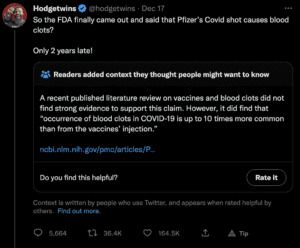Another ‘conspiracy theory’ graduates into establishment reality…
Those who watched Died Suddenly know that there is a disturbing trend emerging in heavily vaccinated countries that ‘coincides’ with the rollout of Covid vaccines.
Additionally, life insurance claims are up 40% year-to-year.
We have brought the truth to you over the last 2 years and everyone reading this knows that blood clotting is a potential side effect of the experimental Covid-19 shots.
Now, after 2 years, the NIH and healthcare ‘experts’ are finally starting to agree…
A recent study posted on the NIH website explores the link between Covid-19 shots and the formation of blood clots; despite this, officials, including the scientists in the study, continue to claim that contracting Covid-19 poses a 10x greater risk of blood clots than the shots…
The Hodgetwins sounded the alarm on the study:
So the FDA finally came out and said that Pfizer’s Covid shot causes blood clots?
Only 2 years late!
— Hodgetwins (@hodgetwins) December 17, 2022
The tweet was apparently fact-checked, although the fact check allegedly appeared and disappeared:

Damn did the Pfizer team try and fact check us with the note? 🤣
This screenshot is straight from the study! pic.twitter.com/IGcFSNceQS
— Hodgetwins (@hodgetwins) December 18, 2022
The study featured on the NIH public library of medicine website summarized:
Adenovirus vector vaccines (AstraZeneca, Janssen, Sputnik V [no official case reported]) seem to be responsible for developing vaccine-induced immune thrombotic thrombocytopenia.
However, it is not entirely understood what exactly triggers the immune system to cause VITT. That said, there are some speculations about DNA/RNA-PF4 complex, Spike protein itself, and transcription complexities that describe the occurrence of thrombotic thrombocytopenia syndrome reasonably.
In addition, some factors like the patient’s underlying disease or age/sex and hormonal situation of the patient are effective in the management and treatment of VITT. All in all, it appears that first and foremost, physicians should review the testes’ results of anti-PF4-heparin and PF4-polyanion antibodies.
Assessment of D-dimer and fibrinogen levels, as well as imaging methods, may also be helpful for medical doctors in evaluating suspected VITT patients. WHO has recommended the use of IVIG and/or nonheparin-based anticoagulants in individuals who are suffering from TTS after the COVID-19 vaccination.
It has also generally (not in exceptional cases) advised against the use of heparin, platelet infusion, and steroid treatment in such patients.
It should also be noted that although there is a connection between blood clots and COVID-19 vaccination, statistics and data have provided cogent proof that the occurrence of blood clots in COVID-19 is up to 10 times more common than the vaccines’ injection.
The CDC confirms 118k Sudden Arrhythmic Death Syndrome ( #SADS) after covid vaccine roll-out.#StoptheShots #DiedSuddendly#COVID #Pfizer #Mrna 💉 #answersforsean #CDC@mtgreenee @megynkelly @TuckerCarlson @seanhannity @jdfarag @laralogan #WHO #DiedSuddenlydocumentary #Pray 🙏 pic.twitter.com/C63omGKpnf
— Behold Thine Enemy (@BeholdThinEnemy) December 3, 2022
Young fit people suddbely dying, strokes, heart attacks, unusual clots, cancers, is it all random?
Could it be due to the mass experiment that has been carried out on humanity?
Even if there is a small possibility, we need to stop and investigate?#StoptheShotsNow pic.twitter.com/ADk2Vh3miD
— Dr Ahmad Malik (@DocAhmadMalik) December 15, 2022
Soon, he will not be able to walk the streets. Soon! pic.twitter.com/N5byWSXatk
— Kelly DNP🩺 Functional/Integrative Med (@kacdnp91) December 13, 2022
Previously, Bloomberg reported:
Bloomberg polled 13 vaccine specialists, infectious disease doctors and public health experts on the latest Centers for Disease Control and Prevention recommendations about getting the new booster shots from Moderna Inc. and the partnership of Pfizer Inc. and BioNtech SE.
Not even half of those surveyed fully endorsed the CDC’s latest guidance.
Some said people should consider waiting longer than the two months recommended between doses, while others thought only higher-risk people should get another shot right now.



Join the conversation!
Please share your thoughts about this article below. We value your opinions, and would love to see you add to the discussion!